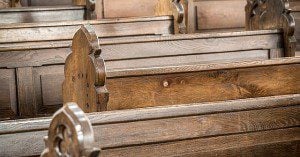A friend, intent on pressing all my buttons, brought this curious advice to my attention. It’s all about what to do if your church is very small and you want it to become very big. Say you have a hundred people in your congregation, which is fine, but you’re not reaching your potential, you could be having a thousand people filling up your comfortable, well arranged soft padded chairs—pews are probably not the right kind of seating option for so many. Don’t you want thousands of people in your church? Of course you do. Everyone does. But you don’t have that many, do you. So here’s what to do.
The first and most important thing you should do when transforming your church from an organization of proportions pathetic and small into one that is glorious and triumphant, is to look at all the pastoral care you’re doing and scale that right back. If you are constantly visiting people in the hospital or in their homes, you won’t have time to prepare your sermon (this is true) or work on developing your leadership structure (also true but less interesting). Also, you might become co-dependent in your pastoral care, too closely connected so that you become conflict averse and unwilling to tell the truth to the people under your care (also true). Or, the people themselves might become too attached to you and the idea of you always being available to them (also true). If you find yourself in this untenable situation, you need to move to “groups based pastoral care” where the people in life or community groups care for each other. Only very rarely should the congregation need you for pastoral care.
Also, outsource counseling to professional counselors, and sign up for the masterclass in church growth. Which is all very interesting advice, especially as today is the Feast of Weeks, or Pentecost.
You remember, of course. Jesus had disappointed his friends so much by not establishing his earthly kingdom in the obvious and exultant way they had so hoped. They were beginning to get a glimpse of why he had died, and certainly of why he rose again, but they were still pretty sure that he should sit down comfortably on some earthly throne, and they should make a lot of the people who were persecuting them the footstools for their tired feet. So when Jesus goes away, they are left craning their necks in disappointment, hanging about together in Jerusalem, going to the temple to pray and generally carrying on with life in that sort of anti climatic way you do when some startling occurrence fundamentally changes your way of being, but there is yet no outward expression of it. You wonder if it even happened. You hope it did, but also, everything is so unhappily the same. Then, finally, on a day already long established, as they are altogether in one place, the Holy Spirit comes with signs they know and recognize, and they are molded and shaped, as one might a loaf of bread, into the church.
A church of about 120 that grows to be a few thousand with pressing pastoral care concerns. Some of which the disciples, now apostles, address by taking the advice of our friend above. They appoint some deacons, or leadership structure if you will, and they decide not to jettison all their prayer and study time to wait tables.
And yet, one has to stop and ponder the very means by which the church is formed, and the terribly intimate image that is used to describe it. Paul, a few pages later in the NT, writing to a church whose legion of troubles, though certainly not confined to the wrong kind of pastoral care, plagued by the usual bad ideas about God and what he is doing, and who Jesus even is, and what the Holy Spirit is for, was therefore not in a position to outsource said pastoral care, nor their emotional problems to a professional counselor. They needed spiritual correction. They needed him, the pastor, to put them back on the right road. Their groups-based caring for each other was a disaster.
So Paul reminds them that they are some kind of organism that, to most of us, unmoved by any scientific knowledge, is so complex, mysterious, and here is the kicker, so knit together, that one is likely to be thrown into confusion trying to work out the metaphor. They are a Body. And not just any body, but the spiritual, mystical manifestation of Christ’s own body. Now, if one part or another is cut off, it’s not that a little sap oozes out and the discarded branch burns merrily over a roaring fire, there are the more pressing consequences of blood and pain. Something they should know about, sharing the very body and blood of their Lord round every week. Except that they’re getting that part wrong too.
The human body is such a precarious and anxious vehicle in which to be carried along through life. It is so easily hurt. It is so weak. It is so, well, even for someone over 6 feet, relatively small in relation to the mountains and hills, or even the houses it builds as a comforting place to collapse after a long day of work. As it gets older, it gets smaller. The danger and fear of death press upon it. Even at its most glorious—the beauty of youth and strength and vigor emanating, even with joy—it can disappear as a sigh through catastrophe or disease.
Not to mention, if you have a body, all your own fears and feelings about having it. Who among us, staggering into the day, shuffling everyone out the door for church, will not stand before a phalanx of flung down garments, trying to clothe the self in something glorious, and yet comfortable, but that also fits well, that copes with those parts that don’t bring the feeling of joy and beauty that we know they should. And yet, those parts that frustrate you, you wouldn’t go and remove them before getting in your car and flying down the road because now you’re late because you never have anything to wear.
The human body needs a comforter, a helper, a pastor, a friend. And so Jesus, when he left to go sit down, did not leave his own Body without such a person to guide and to bless. He joined himself to his body—which is such a useful thought, because even though the body is inexorably connected to itself, aren’t all the wretched psychological, emotional, and spiritual divisions even within the self so frustrating to sort through, wouldn’t it be nice if what you knew with your mind really did produce right action and relief from distress in the emotions and the heart?—so closely as to abide, to live inside it. Once the Holy Spirit moves in, you really can’t make him move out, no matter how hard you may try. The two of you must live uncomfortably together in the very small space of yourself.
Much like the deep discomfort of having to go to church with a lot of people you are not sure you really want to be connected to in any meaningful sense, not once you really get to know them. If you become bound to them, what if you want to get out? What if they hurt you? What if you hurt them? In such discomfort, a comforter is essential.
In such a jumble, the numbers are the least important thing you ought to worry about, though you do, because the body isn’t supposed to age and get smaller, it is supposed to fill the whole earth.
And it will, even if you never get to have a thousand people in your church. Because Jesus didn’t ascend to the Father and leave us alone to sort it out by ourselves. He, through the strange triune mystery of the Godhead, enlivens the church—his own body—by the comforting and strong power of the Holy Spirit. So go to church. Everyone wants you there.













